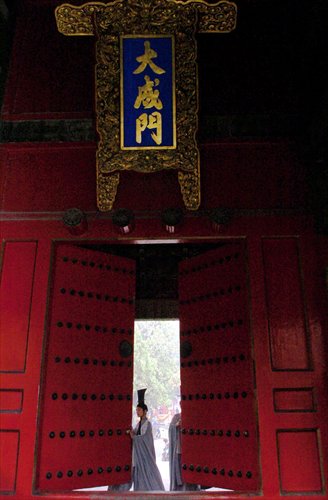HOME >> CHINA
Scholars call for a ban on churches in Confucius’ hometown
Source:Global Times Published: 2016-1-26 20:08:01

Performers open the gate of the Confucius Temple in Qufu, East China's Shandong Province on September 28, 2005, when a memorial ceremony was held to commemorate the 2556th birthday of Confucius. Photo: IC
A Confucian scholar recently renewed the call to ban churches in Qufu, the ancient Chinese philosopher's hometown, triggering heated debate online as to whether this is needed to save the local culture or an unfair infringement on residents' religious freedom.
The scholar, Zeng Zhenyu, published an article on January 21 on rujiazg.com, a website on Confucian studies, criticizing the local governments of Qufu and Jining, which administrates Qufu, East China's Shandong Province for "secretly" building a Protestant church three kilometers to the southeast of the Confucius Temple. He included pictures in his article that he claimed were of this "secret" church.
Zeng, also a local political adviser, claims in the article that in 2012 a deputy mayor of Jining told him that the authorities would not build new churches in Qufu.
In 2010, 10 scholars signed an online open letter in which they stated their opposition to plans for a Gothic-style Protestant church in Qufu, arguing the project would trigger religious and cultural conflicts, after media reported that there had been a ground-breaking ceremony for a church 3 kilometers from the Confucius Temple.
The Holy Trinity Church was scheduled to be built in Yuzhuang village in Qufu. The church was designed to accommodate 3,000 people and would have stood 41.7 meters high. An exchange center for Christianity and Confucianism will also be built, the Xinhua News Agency reported.
Citing anonymous local residents, Zeng said that the church had actually existed on the site for three years already as a one-story building and will be reconstructed and expanded after the Spring Festival in February.
In response, an official who requested anonymity at the Jining religious department told the Global Times that he has no knowledge of the new church.
Yang Chunmei, a professor at Qufu Normal University, said in an article published Tuesday on news portal thepaper.cn that the photos posted by Zeng were not of a church "secretly built" after 2012, but a makeshift church that has stood for a decade.
Zeng rejected an interview request from the Global Times, saying that talks are ongoing with local authorities to solve the issue.
Resist foreign aggression
Zeng wrote in his article that Confucianism is "irreplaceable" in Chinese culture, and so is the culture represented by Qufu. He also argued that there has never been a Taoist temple in Qufu and the town's Buddhist temples are also located away from the downtown area and are small-scale.
The three most famous cultural sites of Qufu are the Temple of Confucius, the Cemetery of Confucius and the Kong Family Mansion. Together, these three sites have been listed as a UNESCO World Heritage Site since 1994.
"According to historical records, foreigners planned to build a church in the west of Qufu in the early 20th century, triggering opposition from Confucius's decedents and local residents. The same thing happened in Zouxian county when local rich people called to ... stay united and resist foreign aggression," the article said, concluding that a ban on churches in Qufu is necessary to prevent "intense controversy" in society.
According to the Qufu Gazatte, American missionaries introduced Protestantism to Qufu in the first decade of the 20th century. However, contrary to Zeng's image of local resistance to the religion, the registered Protestant population in Qufu had risen to between 7,000 and 8,000 by 2011, while the number of unregistered Christians may exceed 10,000, Feng Zongjie, head of the Qufu Committee of Three-Self Patriotic Movement of Protestant Churches in China, told the Global Times previously.
Inclusiveness
While Zeng called for a halt to church construction to avoid "intense controversy," online debates have been ignited once again.
While Confucian scholars insisted it improper to build a church "towering over" the Confucius Temple, some netizens countered that Qufu residents should not lose their right to religious freedom.
A netizen calling himself "Confucian scholar Chaoming" wrote on his Weibo that the authorities should keep Qufu as the holy city of the East and of Confucianism. "It is inappropriate to build mosques or churches on a large scale in the holy city … authorities should work to promote Confucianism and avoid turning the holy city of the East into a city of foreign religion."
Another Sino Weibo user said that the core of the problem is whether the construction site is designated for religious venues and if Qufu needs a church. Also they argued that local residents' opinions toward the church must be taken into account.
"It is first of all a good thing to see active discussions, which is a sign of the inclusiveness of the present society. As our national strength grows steadily, the desire has awakened to seek ancient wisdom from our past, during which process we have indeed selected much refined knowledge," Huang Jianbo, a professor of the School of Social Development at East China Normal University, told the Global Times.
However, cautions must be taken to prevent simplifying the craze for traditional culture, especially online, where rhetoric can become bigoted, Huang noted.
Newspaper headline: Cross over crosses
Posted in: Society